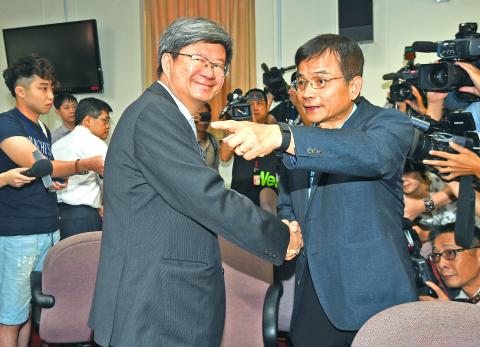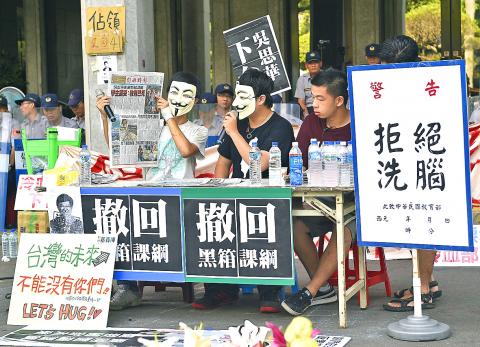A legislative cross-caucus meeting yesterday decided against an extraordinary legislative session, as student protesters had demanded, and instead advised the Ministry of Education (MOE) to immediately launch reviews of curriculum guidelines in accordance with the Senior High School Education Act (高級中等教育法) and to allow schools to freely choose which textbooks they use.
A meeting in the legislature was held yesterday to decide whether an extraordinary legislative session was needed. The meeting had been scheduled to take place at 10:30am, but did not begin until nearly noon, after a prolonged cross-caucus negotiation behind closed doors.
Faced with the Chinese Nationalist Party (KMT) caucus’ strong opposition, the Democratic Progressive Party (DPP) caucus withdrew its proposal to call an extraordinary legislative session to discuss whether to withdraw new curriculum guidelines. Instead, it was agreed in the cross-caucus negotiation that the Ministry of Education would be advised to adhere to Article 43 of the act to immediately establish a “curriculum council” to examine senior-high school curriculum guidelines, and that schools should be free to choose their own textbooks in the new school year.

Photo: Lo Pei-der, Taipei Times
The KMT caucus, in a news conference before negotiations took place, said it had decided during its caucus meeting not to call an extraordinary legislative session for the curriculum controversy. The resolution was approved by “about 50 legislators that attended the caucus meeting” opposing the DPP caucus’ proposal. The KMT holds 65 seats in the legislature.
“Minister of Education Wu Se-hwa (吳思華) was also present [at the caucus meeting] to report on the issue and said that the curriculum was promulgated in February last year. The anti-curriculum [protest] is a pseudo-dispute, since the new curriculum took effect on Saturday and the textbooks have been printed. It is impossible to recall the textbooks,” KMT deputy caucus whip Lin Te-fu (林德福) said.
“Deputy Legislative Speaker and KMT presidential candidate Hung Hsiu-chu (洪秀柱) was at the meeting and agreed with the caucus’ decision not to hold an extraordinary session. She also called for a ‘just’ debate on the issue that should be resolved among adults rather than using kids,” KMT caucus whip Lai Shyh-bao (賴士葆) said.

Photo: Chen Chih-chu, Taipei Times
The Legislative Yuan’s resolution drew a mixed reaction from student representatives, who expressed concerns about the composition and mission of the proposed review committee, while reiterating demands that curriculum guideline adjustments be suspended.
Student spokesman Hsiao Chu-chun (蕭竹均) of the Apple Tree Commune Club said that students did not accept the outcome, but that they still hoped the proposed “review” would lead to a suspension of the guidelines.
“That they have initiated a review committee demonstrates that they believe there are problems with the guidelines’ adoption procedures,” he said. “If there are problems, then the guidelines should be suspended.”
The committee’s membership should be “open” and include academics of Taiwanese history, he said, adding that students should have the right to send representatives.
Hsiao said that students would remain camped in the forecourt of the ministry until it was certain when the review committee would be convened, as well as the composition of its membership.
“We suspect that the committee will not have much of an effect, because it would probably only be charged with writing a report,” Taoyuan High School Alliance convener Peng Cheng (彭宬) said, adding that students hoped the DPP would continue to push for an interim session.
He said the demonstrators would not be dissuaded by the approaching Typhoon Soudelor, and that preparations were already under way to tie down tents and supplies.
Student spokespeople also emphasized that the resignation of Wu would not resolve the current stand-off.
"Wu resigning would only be him taking political responsibility for the absurd things he has done over the past two months — there is no way that his resignation would resolve the problem,” Hsiao said.
Student spokesman Liao Chung-lun (廖崇倫) said that Wu’s comments only showed his “helplessness,” rather than any serious desire to apologize to students.
Students yesterday morning said they would not rule out an “upgrade” to the protests if an interim session was not called, but later said they would need to hold further internal discussions before announcing any further action.
Talks between Wu and a delegation of student leaders, including Northern Taiwan Anti-Curriculum Changes Alliance convener Chu Chen (朱震), broke down after the minister refused to suspend the implementation of the new guidelines.
A report on the legislature’s resolution by DPP caucus whip Ker Chien-ming (柯建銘) yesterday afternoon in the ministry forecourt drew angry remarks from some members of the assembled crowd.
The DPP delegation quickly left the premises after a man stood up and yelled that their report was “crap” and demonstrated the “incompetence” of the DPP.
A brief disturbance erupted after a member of the crowd threw a water bottle at the police cordon in front of the compound, before student leaders re-established order.
Ker was the latest in a string of prominent pan-green politicians to visit the student encampment following Taiwan Solidarity Union Chairman Huang Kun-huei (黃昆輝) yesterday morning and DPP Chairperson Tsai Ying-wen (蔡英文) on Monday night.
Lin earlier yesterday criticized Tsai’s visit, saying: “It is obvious that there was a political force behind the movement, especially when we see Tsai went to the compound.”
Deputy Minister of Education Lin Teng-chiao (林騰蛟) said that the ministry “respected” the legislature’s resolution, urging the students to end their protest “as soon as possible,” as they had already received a “positive response” from both the executive and legislative branches of government.
He added that on Monday the ministry had already stated it was willing to conduct a “rolling review.”
Lin Teng-chiao added that a new curriculum review committee would be convened and the ministry would be open to recommendations about members, including student leaders.
Meanwhile, in response to rumors that Chang An-le (張安樂) — the former leader of the Bamboo Union and founder of the China Unification Promotion Party, also known as the “White Wolf” — would “pass by” the ministry tonight to “urge” the students to go home, Taipei Mayor Ko Wen-je (柯文哲) yesterday said he was not worried, because police would enforce the law, protecting students, as well as preventing the protesters from taking “drastic” action.

A magnitude 7.0 earthquake struck off Yilan at 11:05pm yesterday, the Central Weather Administration (CWA) said. The epicenter was located at sea, about 32.3km east of Yilan County Hall, at a depth of 72.8km, CWA data showed There were no immediate reports of damage. The intensity of the quake, which gauges the actual effect of a seismic event, measured 4 in Yilan County area on Taiwan’s seven-tier intensity scale, the data showed. It measured 4 in other parts of eastern, northern and central Taiwan as well as Tainan, and 3 in Kaohsiung and Pingtung County, and 2 in Lienchiang and Penghu counties and 1

A car bomb killed a senior Russian general in southern Moscow yesterday morning, the latest high-profile army figure to be blown up in a blast that came just hours after Russian and Ukrainian delegates held separate talks in Miami on a plan to end the war. Kyiv has not commented on the incident, but Russian investigators said they were probing whether the blast was “linked” to “Ukrainian special forces.” The attack was similar to other assassinations of generals and pro-war figures that have either been claimed, or are widely believed to have been orchestrated, by Ukraine. Russian Lieutenant General Fanil Sarvarov, 56, head

FOREIGN INTERFERENCE: Beijing would likely intensify public opinion warfare in next year’s local elections to prevent Lai from getting re-elected, the ‘Yomiuri Shimbun’ said Internal documents from a Chinese artificial intelligence (AI) company indicated that China has been using the technology to intervene in foreign elections, including propaganda targeting Taiwan’s local elections next year and presidential elections in 2028, a Japanese newspaper reported yesterday. The Institute of National Security of Vanderbilt University obtained nearly 400 pages of documents from GoLaxy, a company with ties to the Chinese government, and found evidence that it had apparently deployed sophisticated, AI-driven propaganda campaigns in Hong Kong and Taiwan to shape public opinion, the Yomiuri Shimbun reported. GoLaxy provides insights, situation analysis and public opinion-shaping technology by conducting network surveillance

‘POLITICAL GAME’: DPP lawmakers said the motion would not meet the legislative threshold needed, and accused the KMT and the TPP of trivializing the Constitution The Legislative Yuan yesterday approved a motion to initiate impeachment proceedings against President William Lai (賴清德), saying he had undermined Taiwan’s constitutional order and democracy. The motion was approved 61-50 by lawmakers from the main opposition Chinese Nationalist Party (KMT) and the smaller Taiwan People’s Party (TPP), who together hold a legislative majority. Under the motion, a roll call vote for impeachment would be held on May 19 next year, after various hearings are held and Lai is given the chance to defend himself. The move came after Lai on Monday last week did not promulgate an amendment passed by the legislature that